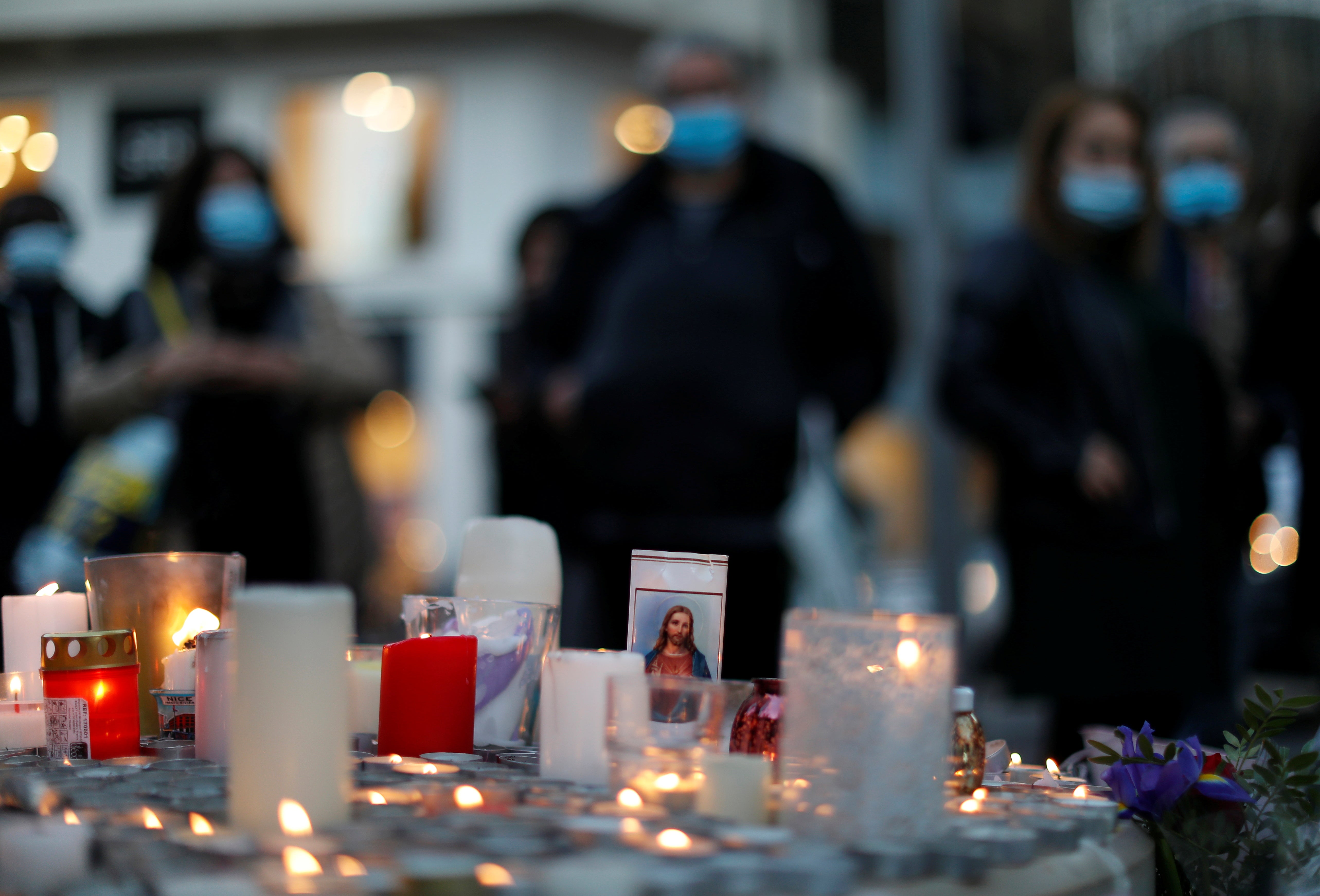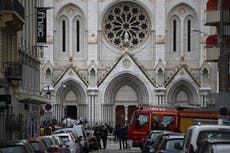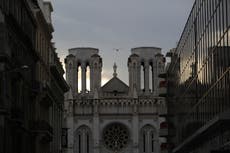Why the latest Nice terror attack differs from the horrors of four years ago
This week’s terror attack in Nice took place against a backdrop of diplomatic tensions, reports Kim Sengupta


Notre-Dame Basilica, the church where three people were knifed to death this week is less than two miles from Promenade des Anglais where Nice experienced another horrific terrorist attack four years ago.
A 19-tonne truck was used that time to plough into families celebrating Bastille Day, killing 86 people and injuring 458 others. President Francois Hollande announced the extension of the state of emergency which had been declared following the Paris attacks the previous year.
Thursday’s murders in Nice were followed by arrests of two men. One was near a church in Sartrouville, north of Paris, of a suspect carrying a knife after his father told the police that he was about to commit violence; the other person was detained as he was boarding a train in Lyon carrying a long-bladed weapon. A security guard was also stabbed and injured outside the French consulate at Jeddah in Saudi Arabia.
Arriving in Nice after the killings, Emmanuel Macron declared that it was “clear that France was under attack… Because our values of freedom and our desire not to give in to terror. I say it with lots of clarity again today, we will not give any ground.”
Like Hollande in 2016, Mr Macron raised the terror alert level to “maximum emergency”. Soldiers will be deployed to guard schools, churches and synagogues. The country’s missions in a number of countries have been placed in high alert.
The 2016 massacre was carried out by Mohammed Lahouaiej-Bouhel whose family had originally come from Tunisia.
While reporting on the attack at the time I spoke to his family, friends and neighbours. His father, Monthir Bouhiel said his son suffered from psychological problems and was sometimes unstable. "He would get very angry, and would break things for no reason, he was put on medication. But the one thing he did not get angry about was religion, he did not go to mosque, he drank.”
Mr Bouhiel was apparently unaware that his son had been studying jihadist execution videos and had met some young men with radical views and had supposedly discussed taking revenge for the treatment of Muslims in France. Isis claimed credit for the murders, but there was no strong evidence of direct links with the group.
International media attention moved on relatively quickly from the Nice killings to the attempted coup in Turkey against the government of Recep Tayyip Erdogan two days later. The crushing of the plot, which was blamed on the followers of the exiled cleric Fethullah Gulen, was followed by a widespread crackdown and the accumulation of Mr Erdogan’s authoritarian powers.
Details will no doubt emerge over the next few days about the motivation of Brahim Aoussaoui, the Notre-Dame killer. Police are questioning a man who was allegedly in touch with him in Nice.
Mr Aoussaoui was born and brought up in Tunisia and came to France earlier this month, after, it is said, crossing the Mediterranean as a refugee. Officials of the justice ministry in Tunis said that he was not known to have links with any extremist organisations.
There is a growing international diplomatic crisis over what is unfolding in France.
A fortnight ago history teacher Samuel Paty was beheaded after he showed caricatures to his class, including one of the Prophet Muhammad, during a discussion on free speech. The murder led to the French government pledging a crackdown on Islamist extremism, including shutting down mosques and other organisations accused of spreading radicalism.
The government’s action and Mr Macron’s choice of words about extremism and Islam led to fierce denunciation - not so much from mainstream Muslim organisations in France, but from abroad, in social media, religious organisations and political leaders.
There were attacks on Mr Macron from, among others, Pakistan’s prime minister Imran Khan and Iran’s foreign minister Javad Zarif. But none more severe than Turkey’s Mr Erdogan, who said the French president has “lost his mind” and called for a boycott of French goods in Muslim countries.
The magazine Charlie Hebdo, whose cartoons of the Prophet Muhammad had led to an attack on its offices, and the killing of 12 people five years ago, then published a front page illustration on Wednesday showing Mr Erdogan in his underwear pulling up the skirt of a woman wearing a hijab.
The Turkish president fumed “Macron is against Muslims. He is sowing seeds of hatred. Turkey will take necessary legal, diplomatic actions against loathsome Charlie Hebdo publication".
There has been condemnation of the Nice church murders and expressions of solidarity with France from international leaders. Donald Trump said “American stands with our oldest ally in this fight”. Boris Johnson spoke of how appalled he was at the “barbaric act”. Pope Francis mourned the attack “that sowed death in a place of prayer and consolation”.
Iran’s Mr Zarif said “peace cannot be achieved with ugly provocation”. A Turkish foreign ministry spokesman said “we strongly condemn the attack committed today inside the Nortre-Dame church in Nice”. There have been no words publicly, as yet, from Turkey’s president.
All this is being played out against a backdrop of political tension. What may not be widely known is that while Mr Erdogan is calling for a boycott of French goods, Turkish goods are facing a boycott in Saudi Arabia, where many shopkeepers are replacing them with Greek and Egyptian products.
There is national rivalry behind this. The Saudi Royal Family and Mr Erdogan are widely seen as vying for the leadership of Sunni Islam. Turkey had used the murder of Jamal Khashoggi to hugely embarrass the Saudis. The Turks have backed Qatar in its standoff with the bloc led by the Saudis and the UAE.
Turkey and Greece, historic adversaries, are currently in confrontation in the eastern Mediterranean over access to gas reserves. Egypt is a member of the East Med Gas Forum, along with Greece, from which Turkey is excluded. Relations between Ankara and Cairo have been fractious ever since the overthrow of Mohammed Morsi’s Muslim Brotherhood government, which Turkey backed, by Gen Abdel Fatah al-Sisi in a coup seven years ago.
Mr Macron has sent French warships into the eastern Mediterranean and offered military support to the Greek government including the possible supply of Rafale jets. The French president has declared “we have to create a Pax Mediterranea because we see an imperial regional power coming back with some fantasies of its own history, and I am referring essentially to Turkey".
Turkish defence minister Hulusi Akar retaliated, describing Mr Macron as “trying to take on the role of Napoleon, who died 200 years ago. But we can all see that he is neither powerful enough nor tall enough to do it. We are not pursuing any kind of imperialistic aims. Here we are protecting our rights and the law... Macron is going after some roles to conceal his own problems. He comes from thousands of kilometres away and tries to seize a role in the Eastern Mediterranean”.
A pattern is seen by some western European politicians in Turkish action in the Mediterranean and its intervention in French affairs. European Council president Charles Michel tweeted “rather than a positive agenda, Turkey chooses provocations, unilateral actions in the Mediterranean and now insults. It’s intolerable".
The Mediterranean is just one of the arenas between Paris and Ankara. In Libya France has been accused of backing the forces of Gen Khalifa Haftar while Turkey is actively supporting the UN backed government of Fayez al-Sarraj. Turkey has backed Azerbaijan in the conflict with Armenia over Nagorno-Karabakh - Macron has described the Turkish move as “reckless and dangerous”.
Provocative commentaries by international politicians have continued after the Nice murders. Mahathir Mohamad, the former Malaysian prime minister, twitted: “Muslims have the right to kill millions of French people for the massacres of the past.”
Mr Mahathir later claimed that his comments have been misrepresented and what he meant to say was that Muslims had never sought revenge for the injustices of the past. But then he went on to say that Mr Macron was “ very primitive” and “not showing he is civilised”.
Australian prime minister Scott Morrison described Mr Mahathir’s remarks as “absurd and abhorrent”. French ministers have demanded that Twitter suspend the former prime minister from the platform.
So the war of words continues and insults keep flying between international leaders engaged in strategic confrontations. The result is the adding of fuel to a combustible scenario and, as Nice has experienced, the grim prospect of repeated savage attacks with more innocent lives lost.
Join our commenting forum
Join thought-provoking conversations, follow other Independent readers and see their replies
Comments




Bookmark popover
Removed from bookmarks